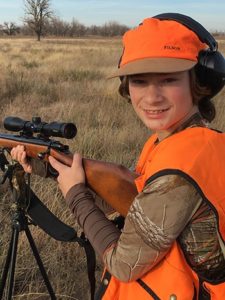 After extensive population surveying, U.S. Fish and Wildlife Service biologists at Buffalo Lake National Wildlife Refuge opened the refuge to two youth hunters selected through a lottery. One of the hunters, 14-year-old Gavin Paschall (pictured) of Fort Worth, Texas, successfully harvested a mule deer at the northern Texas panhandle refuge Dec. 2.
After extensive population surveying, U.S. Fish and Wildlife Service biologists at Buffalo Lake National Wildlife Refuge opened the refuge to two youth hunters selected through a lottery. One of the hunters, 14-year-old Gavin Paschall (pictured) of Fort Worth, Texas, successfully harvested a mule deer at the northern Texas panhandle refuge Dec. 2.
Hunting is not available at all national wildlife refuges, but we are expanding hunting opportunities at refuges when compatible with wildlife management goals. Before deer hunting could be allowed at Buffalo Lake, biologists observed deer populations to assess stability. Hunting is a tool for wildland managers to balance game populations.
“Working very close with the Texas Parks and Wildlife Department, our sister state agency, I began going on spotlight surveys and assisting them on data collection,” said Buffalo Lake Refuge Manager Jude Smith. “From these surveys, I determined that two deer should be harvested. And that the first hunt should be for youth.”
Hunting has roots for most human civilization. One of the most valuable things hunters bring to non-hunters is lobbying for the expansion of public lands. Hunting gear is taxed federally, and those funds go to conservation efforts that benefit both hunters and non-hunters. The practice of hunting encourages future generations to value public wildlands, wildlife and other nature conservation values.

“Hunting with my son means a great deal to me,” said Gavin’s father Shawn Paschall (pictured with Gavin). Shawn is a criminal defense attorney in Fort Worth.
“Not only do we get the benefit of spending time together and creating lifelong memories, it also provides an incredible teaching opportunity,” Shawn said. “Hunting is not easy. It takes preparation, planning, effort and discipline. It is important to me to hunt in an ethical manner. I try to instill in him that second to safety, the humane taking of game is the goal. That means training with the firearm to ensure a humane kill and recovery of the game, exercising discipline not to take low percentage shots that might wound, preparing for the hunt by studying the geography and our quarry, taking care to preserve the meat for consumption, following all the laws all the time no matter if someone is watching or not.”
Hunting is a wildlife management tool for wildland managers, as state game and fish agencies and the U.S. Fish and Wildlife Service seek to keep delicate ecosystems in balance.
“There have been several examples of when deer and elk populations exploded, and they basically ate themselves out of habitat, then the populations dropped off because there wasn’t enough food,” said Dr. Gary Roemer, a professor of wildlife ecology at New Mexico State University.
Opening even a limited hunting opportunity at Buffalo Lake is a highly appreciated addition to a state where less than 1 percent of the landmass is public. Making hunting more accessisble means turning more people on to wildland conservation values.
“A big issue is that in Texas there is very little public land and a lot of hunters or potential hunters,” said Jude Smith. “Most of these hunters have relatively few places to hunt, and have to either acquire a lease to hunt on private land, which can be expensive, or to hunt on public land in other nearby states such as New Mexico or Colorado, which can also be expensive.”
Legal hunting on a grand scale adds value to wildland conservation throughout the country, an advantage for both hunters and non-hunters alike.
“The money spent by hunters in the form of excise taxes on ammunition and other gear goes to the Wildlife and Sport Fish Restoration program of the U.S. Fish and Wildlife Service. The money then goes back to the state game and fish agencies to manage hunted populations” Dr. Roemer said.
“Non-hunters should know hunters are a great advocates for the preservation of wild lands: they are vociferous about maintaining healthy ,landscapes which can support healthy wildlife populations because they not only love to hunt, but they love to just go out outdoors,” said Roemer.
